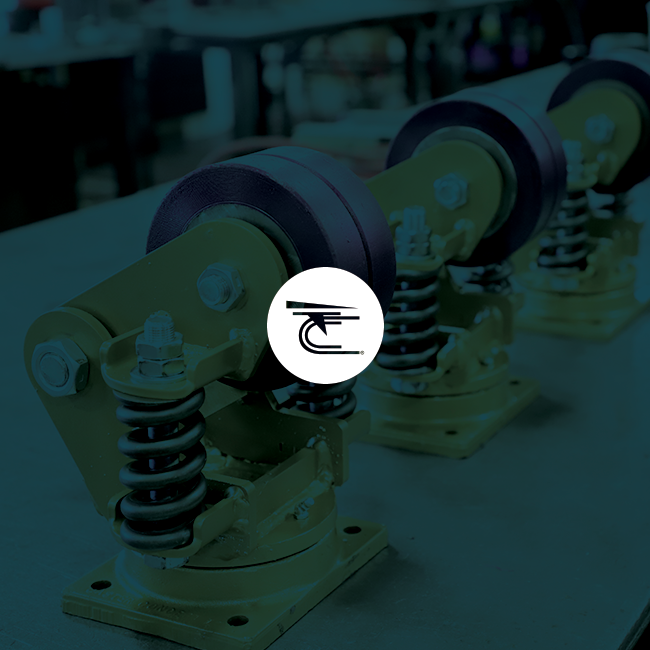

All industrial casters fall under a heavy duty caster classification. However, there is a difference between the duty rating, which is determined primarily by maximum weight capacities and includes factors like durability and construction. These casters are found in heavy industrial applications where operational dependability is imperative.
Defense contractors, aerospace plants, shipyards, aviation factories, heavy equipment manufacturers, and any material handling operation involving the movement of extreme loads are where these high-capacity casters are in their element.
A caster is an undriven, single, double, or compound wheel that mounts to the bottom of a larger object (usually called a rig) so operators can easily move the object. Casters come in different materials, wheel diameters, tread widths, load ratings, and overall heights to give your equipment mobility in many kinds of work environments.
Of all the benefits of using a caster, ease of movement and maneuverability are two primary ones. How easily a caster moves depends mainly on the rolling resistance associated with starting it moving and keeping it moving.
The resistance you experience when pushing a cart from a dead stop is the initial push force. When a cart is in motion, and you want to keep it going, you are working against its rolling resistance. The lower the rolling resistance, the less effort it takes to move the wheeled equipment around. In general, larger wheels made of a harder material have lower starting and rolling resistance. One drawback with wheels that feature a bigger diameter is that the cart will have a higher center of gravity. This added height can make a cart less stable, especially with heavier, high stacked loads.
An industrial caster wheel’s rolling resistance is also affected by the material making up the wheel. And each material has its advantages. These include:
Caster Concepts offers a wide variety of wheel materials to meet your needs. In general, however, the versatility of polyurethane is hard to beat. Polyurethane wheels are some of the most ergonomic on the market and provide less resistance than all other wheels. In addition to these benefits, another advantage for our customers is that Caster Concepts manufactures all our polyurethane wheels in house using an open casting polyurethane molding process. This allows us to maximize quality and flexibility, ensuring you get the best tread formulation. It also enables us to create custom formulations for specific uses, such as helping to minimize scrap metal pickup, for example.
Casting also plays an important role in the manufacture of polyurethane. In the process of fabricating industrial caster wheels, the task of polyurethane casting (the pouring of molten poly into molds) is done manually. This helps ensure that no air gets trapped which could weaken the cross-linking of the materials. In heavy duty industrial applications, proper casting also provides the appropriate balance of tear strength (force necessary to tear a material) and tensile strength (How much the material can stretch before failing).
When choosing a custom polyurethane caster wheel, there are different levels of hardness. We measure this hardness in terms of Durometers, with A and D being the two most common types.
-Higher numbers on the durometer scale mean the wheel has a greater resistance to indentation
-Lower numbers mean less resistance and softer materials.
In industrial wheels, standard durometers range from 70 shore A, which is slightly harder than typical rubber materials, to 70 shore D, which is as hard as a bowling ball.
The hardest durometer polyurethane we offer, shore 70D, is designed to maximize weight capacity. This extra hard polyurethane is ideal for heavy loads. It is also non-marking and wear resistant.
Caster Concepts is one of the country’s leading providers of standard and custom industrial caster wheels. Proudly built in America, these caster products ranging from medium-duty series to heavy-duty series to meet any application. If you would like more information on how Caster Concepts can help your situation, please call 517-680-7950.